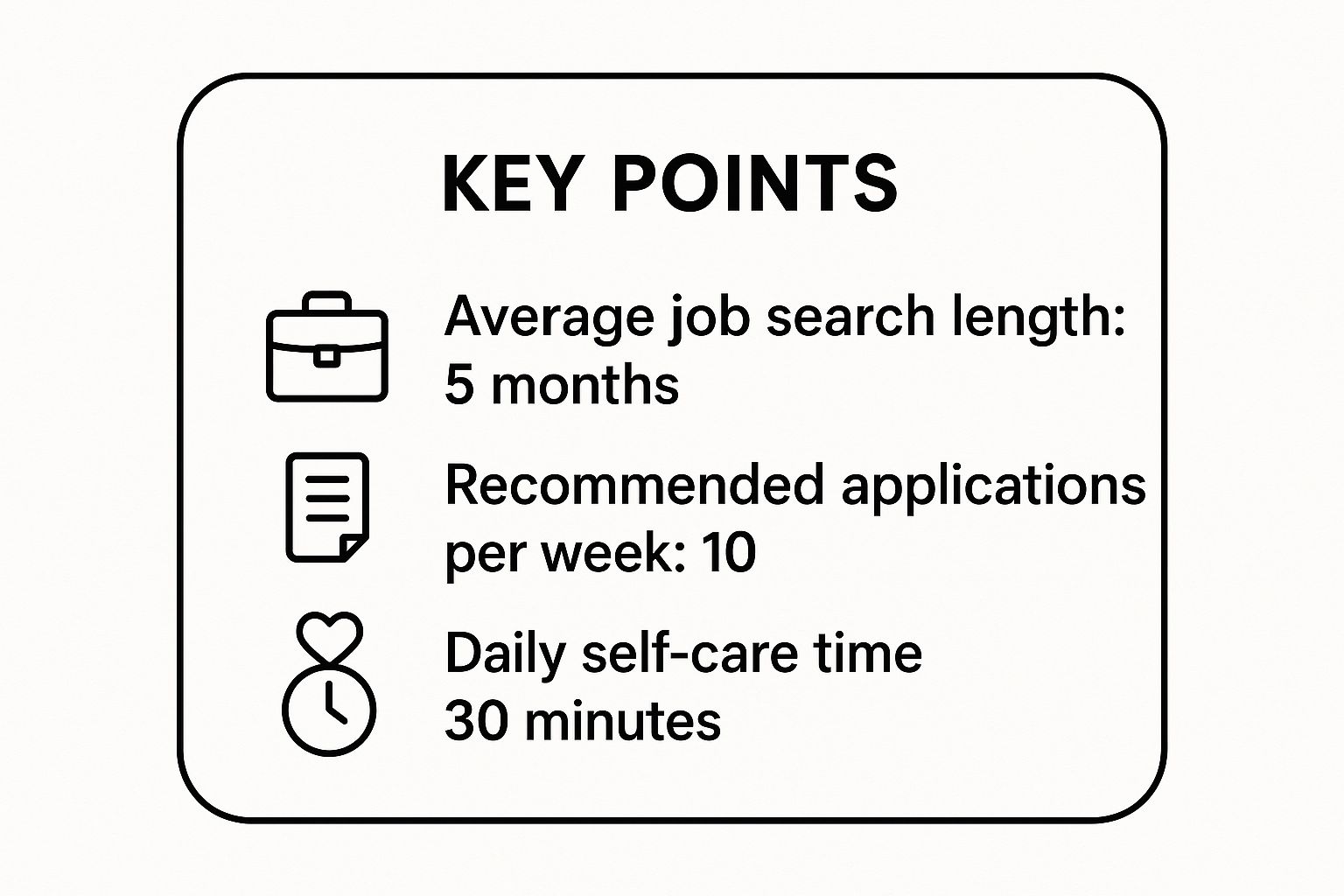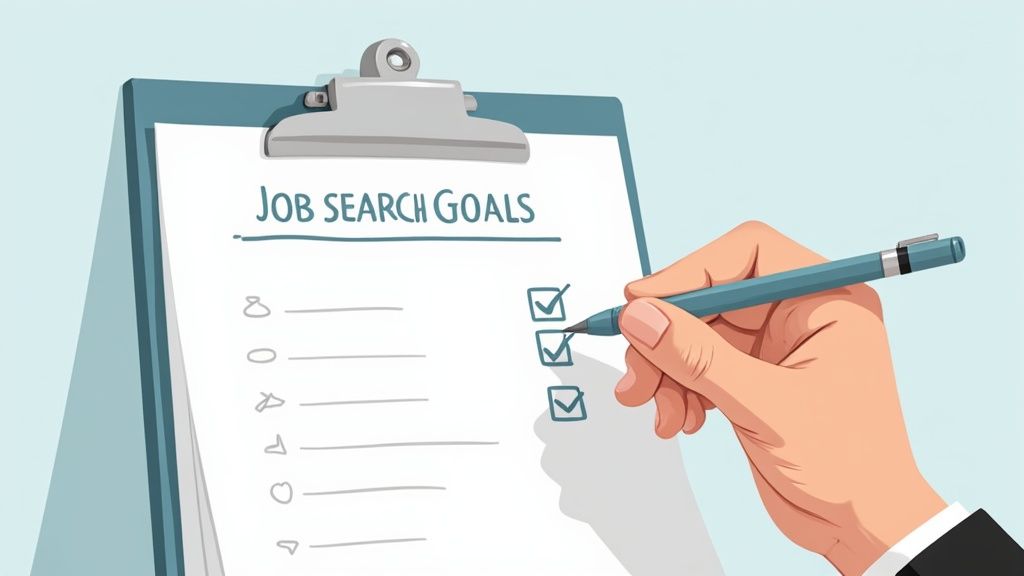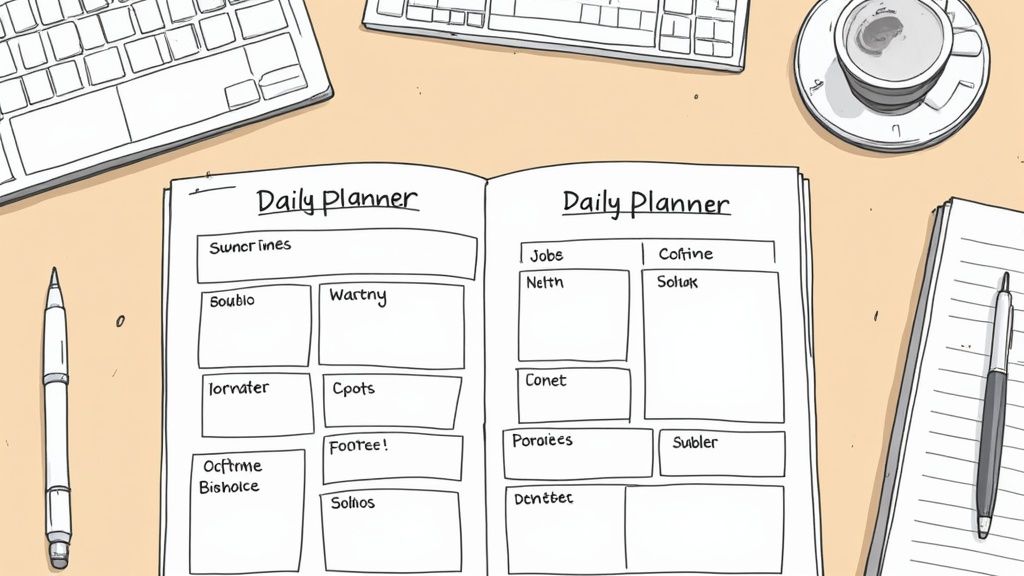How to Stay Positive While Job Hunting: Tips to Keep Going

Let’s be real for a moment. Staying positive while job hunting isn't about slapping on a fake smile and pretending everything is fine. It’s about building genuine, rock-solid resilience.
The secret? It boils down to a powerful combination of structuring your search, mastering your mindset, and building a strong support system. This isn't just fluffy advice; it’s a practical framework for managing the inevitable highs and lows so you can stay motivated for the long haul.
The Reality of the Modern Job Hunt
Searching for a job today can feel like a full-time emotional rollercoaster. One day you’re riding high after what felt like a perfect interview. The next, you’re staring at a silent inbox, and your energy completely flatlines. Sound familiar? You are definitely not alone.
The truth is, the process is often far longer and more complex than anyone prepares you for. Feeling frustrated, drained, or uncertain is a completely normal response.
The goal isn't to power through and ignore those feelings. It’s about creating smart strategies to navigate them. In this context, "positivity" is really just another word for resilience—that crucial ability to bounce back from a rejection and keep moving forward. It’s about protecting your mental health while you work toward that next big career move.
To get there, we’ll focus on three core pillars that have helped countless people land roles they love without losing their sanity.
Pillars of a Resilient Job Search
A successful job search that doesn’t burn you out is built on more than just firing off applications into the void. It demands a balanced approach that fuels your motivation from start to finish.
- A Structured Search: This is all about creating a routine and setting small, achievable weekly goals. Structure gives you a sense of control when everything else feels completely up in the air.
- Mindset Mastery: This is the game-changer. It’s learning to see rejection as feedback, not a personal failure. It’s celebrating the small wins—like a great networking chat—to build momentum and keep your confidence intact.
- A Strong Support System: You can’t do this alone. Period. Building a network of people who offer real encouragement (not just lukewarm job leads) is absolutely essential for staying grounded.
This image breaks down some key numbers to help you frame your expectations from day one.

As you can see, the job hunt is a marathon, not a sprint. These numbers aren't meant to discourage you—they're meant to empower you. They reinforce why sustainable daily habits and manageable weekly targets are so much more effective than burning yourself out in a week.
One of the biggest psychological hurdles for any job seeker is dealing with the constant uncertainty and the long waiting periods. Experts agree that your ability to stay positive depends almost entirely on setting realistic expectations and focusing on the small, daily steps you can control, rather than just the final outcome.
To make these ideas more concrete, I've broken down these three core strategies into a simple table. Think of these as the foundation for a healthier, more effective job search.
Three Pillars of Job Search Positivity
Ultimately, a proactive approach is what separates a draining job hunt from a productive one. It shifts your focus from the outcomes you can’t control (like who gets hired) to the actions you can (like refining your resume or networking).
Keeping a simple log of your daily achievements—even small ones—can make a huge difference. For more actionable strategies, check out our guide on modern job search techniques. The job market is always changing, and staying informed on a macro level can also help manage expectations. For a high-level overview, the World Economic Forum offers deep insights into the global labor landscape.
Build a Routine That Protects Your Sanity
Let's be honest: an unstructured job search is a one-way ticket to burnout. When your days dissolve into an endless cycle of scrolling job boards and compulsively refreshing your inbox, anxiety quickly moves in. The secret to staying positive isn't about logging more hours—it's about working smarter within a framework that fiercely protects your mental energy.
Without a defined schedule, the job hunt can easily bleed into every corner of your life, making it impossible to ever truly switch off. This is where a solid routine becomes your most valuable ally. It carves out boundaries, gives you back a much-needed sense of control, and, most importantly, guarantees you have time for the things that actually recharge your batteries.

The Job Search Sandwich Method
One of the most effective strategies I've seen—and used myself—is what I like to call the "Job Search Sandwich." The concept is brilliantly simple: you bracket your focused job search block with activities you genuinely enjoy. This contains the "work" of job hunting to a specific time, stopping it from taking over your entire day.
Here’s how it works in practice:
- The Top Slice (Morning Activity): Kick off your day with something that has nothing to do with finding a job. This could be a morning walk, enjoying your coffee while reading a book, or spending 30 minutes on a personal hobby you love.
- The Filling (Focused Work Block): Now it's time to get down to business. Set a timer for a specific, dedicated period—say, 90 minutes to two hours. During this time, you are laser-focused on high-impact tasks only. Think tailoring your resume for a specific role or sending out a few personalized networking messages, not mindless scrolling.
- The Bottom Slice (Afternoon Activity): When that timer dings, you’re done. Shut the laptop. Seriously. Transition immediately to another fulfilling activity. Maybe you learn a new skill on YouTube, hit the gym, or just call a friend to catch up.
This approach creates small, daily wins that are absolutely crucial for staying motivated over the long haul. It proves to yourself that you're being productive while also honoring your fundamental need for rest and enjoyment. If you want to make the most of that work block, our guide on how to apply for jobs online can help you zero in on what really moves the needle.
Key Takeaway: The goal isn’t to fill your day with job searching. It's to execute high-quality work in short, focused sprints, leaving plenty of room for your actual life.
Why Structure Is Non-Negotiable
Having a plan does so much more than just organize your to-do list; it actively safeguards your well-being. It's not just a feeling, either. Research consistently shows that social support and routine are two of the strongest pillars of positivity during a job hunt. According to the International Labour Organization's global employment trends report, job seekers who stick to a structured schedule report lower anxiety, greater optimism, and better emotional resilience throughout the entire process.
By building a routine, you aren't just managing your time—you're constructing a powerful defense against the emotional exhaustion that derails so many talented people. You are taking back control, one scheduled block at a time.
Learn to Reframe Rejection and Track Your Wins
Let's be honest: rejection is the worst part of any job search. It's inevitable. Whether you get a polite "no, thank you" email or, even more frustrating, the deafening silence of being ghosted, each instance can feel like a personal blow that chips away at your confidence. But here's a secret from those of us who've been in the trenches: the key isn't to somehow avoid rejection. It's to completely change how you see it.
Instead of a judgment, start thinking of each "no" as just another piece of data. It's information. It’s intel. This simple shift in perspective is incredibly powerful because it flips you from being a passive recipient of bad news into an active strategist, learning and refining your approach with every single application.

Adopt a New Internal Script
The story you tell yourself after a rejection is far more important than the rejection itself. If you let your mind spiral into negative self-talk, you’re on a fast track to burnout and despair. You have to consciously, deliberately choose a more empowering narrative.
I once worked with a job seeker who, after getting eight rejections in a single day, simply opened their spreadsheet and checked a box next to each one. That simple physical act wasn't about defeat; it was a symbol that they were now eight steps closer to the one company that would say yes.
"Your career journey is personal and unique. The best thing you can do is work at your own pace—be inspired by others, but don’t let their journey discourage you."
So, when that "we've decided to move forward with other candidates" email lands, catch yourself. Instead of letting your inner critic take over, try a reframe:
Instead of: "They rejected me."
Try: "Okay, that role wasn't the right match for my skills right now."
Instead of: "I bombed another interview."
Try: "What's one thing I learned from that conversation that I can use in my next interview?"
This isn’t just about positive thinking; it’s a practical technique to interrupt the downward spiral and keep your focus on what you can actually improve. This skill will serve you long after you land a job. As you keep refining what you're looking for, you'll find more helpful strategies in our guide on how to find a job you love.
Celebrate What You Can Control
If you're only waiting for a job offer to feel successful, you're putting your sense of accomplishment entirely in someone else's hands. It's time to take that power back. The way to do this is by celebrating the small, controllable victories you rack up every single day. These wins are concrete proof that you're moving forward, no matter what happens with interviews.
Create a simple system to keep score. It could be a "Win Jar" where you drop a slip of paper for each achievement, or maybe a dedicated spreadsheet is more your style.
Your Progress Tracker Might Include:
- Networking: "Had a great 15-minute coffee chat with a manager from one of my target companies."
- Application Quality: "Spent an extra hour tailoring my resume and cover letter for a dream role. It's perfect."
- Skill Building: "Finished that online course on advanced Excel functions to boost my resume."
- Self-Care: "Actually took my scheduled break and went for a run instead of doom-scrolling LinkedIn."
Tracking these small wins gives you tangible evidence of your effort and hustle. It builds real momentum and proves to yourself that your hard work matters, keeping your tank full until the right opportunity finally comes along.
Build a Support System That Actually Helps
Let’s be honest: trying to navigate the modern job search all by yourself is a recipe for burnout. It’s so easy to crawl into a shell of endless applications and creeping self-doubt. But here’s the thing—isolation is the single biggest threat to your motivation.
The trick is to be deliberate about building a support network that offers real, meaningful encouragement, not just lukewarm leads or advice that misses the mark.
Ask for the Help You Really Need
Telling your friends and family, "I'm looking for a job," is a start, but it's not enough. Most people genuinely want to help, but they have no clue how. You have to give them a playbook.
Instead of hitting your network with the vague and often awkward, "Do you know anyone who's hiring?" try asking for something different. Frame your requests around accountability and emotional support. This moves the conversation from a transaction ("find me a job") to a relationship ("help me stay sane").
Here are a few ways to rephrase your ask that get much better results:
- "My big goal this week is to tailor my resume for three specific roles. Could you be my accountability partner and just shoot me a text on Friday to see if I got it done?"
- "I'm feeling totally drained by this whole process. Would you be up for grabbing coffee next week where we're not allowed to talk about jobs at all?"
- "I’m trying to nail my 'tell me about yourself' story for interviews. Could I practice it on you for 5 minutes and get your honest thoughts?"
These kinds of requests are specific, easy for your friends to say "yes" to, and empower them to give you the support that actually makes a difference.
Find Your Job Search Buddy
One of the best things you can do for your morale is to find a "job search buddy." This is someone who is right there in the trenches with you—maybe a former colleague, a friend in a similar field, or even someone you connect with in a professional group online.
Having a peer who gets the unique agony of waiting for a callback or trying to translate a vague rejection email is priceless. That shared experience creates a powerful bond and a safe space to vent without feeling judged.
This isn't just about getting support; it's about giving it, too. You can celebrate each other's small wins, pass along helpful articles or contacts, and offer a much-needed dose of perspective when one of you is hitting a low point.
This kind of peer support transforms a lonely, isolating journey into a team sport. Suddenly, the challenge of staying positive while job hunting feels a whole lot more manageable.
Take Back Control of Your Job Search

Let’s be honest. The anxiety that comes with job hunting often boils down to a feeling of powerlessness. You can’t make a recruiter call you back. You have no way of knowing which companies are about to post your dream role next week. It’s this total lack of control that makes staying positive so tough.
The secret? You have to aggressively reclaim your power by shifting your focus to the things you absolutely can control. Stop obsessing over the results and start concentrating on your actions. This simple mindset shift turns your search from a passive, frustrating waiting game into an active project where you’re in the driver's seat.
When you start breaking the job search down into small, manageable tasks—the things you can actually do today and this week—that sense of dread is replaced by a powerful feeling of accomplishment.
Focus on Controllable Actions
Your mental energy isn't unlimited. So why waste it on all the "what-ifs"? Instead, let's pour that energy into the inputs. Think of your job search not as one massive, intimidating goal ("Get a Job!") but as a series of smaller, winnable projects.
Each of these projects has clear steps you can take right now to move forward. This hands-on, task-oriented approach is the bedrock of a resilient and genuinely positive job search.
Here are the key areas where you hold all the cards:
- Your Resume's Quality: You can't control who ultimately reads your resume, but you can control how perfectly it’s customized for each job description. Spend your time meticulously aligning your skills and achievements with what the employer is asking for.
- Personalized Outreach: You can’t force someone to reply to your networking message. But you can control the quality of that message, proving you’ve done your homework and aren’t just spamming contacts.
- Your Skill Development: You can’t magically gain a required skill overnight. But you can absolutely control your own learning. Dedicate a few hours each week to an online course or tutorial that makes you a more compelling candidate.
- Your Application Volume: You can't control how many other people apply for a role. But you can set a personal goal for sending out a specific number of high-quality, targeted applications each week—and hit it.
The most effective way to beat job search anxiety is to focus on what you can do, not what you’re waiting for. You can’t manage a hiring manager’s timeline, but you can manage your own time, effort, and strategy.
Your Weekly Control Checklist
To put this into action, create a simple weekly checklist of things you can control. This isn't about working yourself into the ground; it's about giving yourself tangible proof that you're making progress. For a deeper dive into building an effective plan, check out our guide to crafting a winning job search strategy.
Your personal checklist could look something like this:
This approach systematically dismantles that feeling of helplessness. Every single box you check is a small victory. It's concrete evidence that you are taking action and building momentum—and that’s exactly how you stay positive through the entire process.
Tackling Your Toughest Job Search Questions
Let's be real. Even with a perfect plan and a positive attitude, a long job search will throw some curveballs your way. It’s those tricky, frustrating moments that can really test your resolve. This is where we get into the weeds and answer those specific "what on earth do I do now?" questions that pop up when you least expect them.
Think of this as your personal cheat sheet for navigating the bumpier parts of the road.
How Long Should I Wait Before Following Up?
This is the classic question that keeps every job seeker up at night, isn't it? The honest answer is that it depends, but a solid rule of thumb is to wait 5-7 business days after the application deadline has passed. If they didn't give you a deadline, give it about a week after you sent your application or had your last interview.
The trick is to walk that fine line between persistence and becoming a nuisance. Your follow-up should always be polite and professional, but it should also add a little something extra. Ditch the generic "just checking in" email. Instead, mention something specific you enjoyed about your conversation or even point to a recent company win you saw in the news. It shows you’re not just waiting by the phone—you're still engaged and paying attention.
One thoughtful, well-timed follow-up is usually all you need. If silence is all you get back, it’s probably a sign to channel that precious energy into other promising opportunities.
What if I Have a Big Gap on My Resume?
First, take a deep breath. Employment gaps are far more common than you think, and the anxiety they cause is almost always worse than the reality. The secret isn't to try and hide it, but to own it with confidence.
You have to frame the gap as a period of purpose, even if it didn't feel like it at the time.
- Upskilling: "I dedicated that time to earning my project management certification, and I'm really excited to put those new skills to work in a role like this."
- Personal Projects: "I actually spent six months developing a personal passion project, which was an incredible crash course in everything from budget management to marketing."
- Life Happens: "I was focused on caregiving for my family during that time, and now I'm fully re-energized and ready to dive back into my career."
Honesty and a forward-looking perspective are your most powerful allies here. Most recruiters will appreciate the candidness and are far more interested in what you bring to the table now.
How Do I Handle Repeated Rejections From the Same Company?
Ouch. Getting rejected over and over again from a company you’d love to work for is a special kind of sting. It's so easy to take it personally and just write them off. But what if you saw it as a puzzle you just haven't cracked yet?
Rejection is almost never about you as a person. It's about finding the right fit, for the right role, at the right time. Every "no" is just a piece of data telling you the alignment wasn't quite there.
After striking out a few times, it's time to change your game plan. Stop blindly applying for the next open role and start focusing on making a real connection. Hop on LinkedIn and find someone who works in the department you’re targeting—not a recruiter, but a potential future colleague. Send them a short, polite message asking for a quick 15-minute "informational chat" about their experience at the company.
This completely flips the script. You're no longer just another resume in a digital pile; you're a proactive professional building relationships and gathering intel. This is also where tracking your efforts becomes non-negotiable. Using a spreadsheet or a dedicated tool to log every application and its outcome is one of the smartest things you can do. Our guide on creating a job application tracker shows you exactly how to set one up and turn that rejection data into a much smarter search strategy.
Feeling buried under the weight of endless applications and follow-ups? Let AIApply handle the tedious work. Our platform takes care of the repetitive parts of your job search, from customizing resumes to sending applications, freeing you up to focus on what you do best—nailing the interview and landing a job you love. See how it works at https://aiapply.co.
Let’s be real for a moment. Staying positive while job hunting isn't about slapping on a fake smile and pretending everything is fine. It’s about building genuine, rock-solid resilience.
The secret? It boils down to a powerful combination of structuring your search, mastering your mindset, and building a strong support system. This isn't just fluffy advice; it’s a practical framework for managing the inevitable highs and lows so you can stay motivated for the long haul.
The Reality of the Modern Job Hunt
Searching for a job today can feel like a full-time emotional rollercoaster. One day you’re riding high after what felt like a perfect interview. The next, you’re staring at a silent inbox, and your energy completely flatlines. Sound familiar? You are definitely not alone.
The truth is, the process is often far longer and more complex than anyone prepares you for. Feeling frustrated, drained, or uncertain is a completely normal response.
The goal isn't to power through and ignore those feelings. It’s about creating smart strategies to navigate them. In this context, "positivity" is really just another word for resilience—that crucial ability to bounce back from a rejection and keep moving forward. It’s about protecting your mental health while you work toward that next big career move.
To get there, we’ll focus on three core pillars that have helped countless people land roles they love without losing their sanity.
Pillars of a Resilient Job Search
A successful job search that doesn’t burn you out is built on more than just firing off applications into the void. It demands a balanced approach that fuels your motivation from start to finish.
- A Structured Search: This is all about creating a routine and setting small, achievable weekly goals. Structure gives you a sense of control when everything else feels completely up in the air.
- Mindset Mastery: This is the game-changer. It’s learning to see rejection as feedback, not a personal failure. It’s celebrating the small wins—like a great networking chat—to build momentum and keep your confidence intact.
- A Strong Support System: You can’t do this alone. Period. Building a network of people who offer real encouragement (not just lukewarm job leads) is absolutely essential for staying grounded.
This image breaks down some key numbers to help you frame your expectations from day one.

As you can see, the job hunt is a marathon, not a sprint. These numbers aren't meant to discourage you—they're meant to empower you. They reinforce why sustainable daily habits and manageable weekly targets are so much more effective than burning yourself out in a week.
One of the biggest psychological hurdles for any job seeker is dealing with the constant uncertainty and the long waiting periods. Experts agree that your ability to stay positive depends almost entirely on setting realistic expectations and focusing on the small, daily steps you can control, rather than just the final outcome.
To make these ideas more concrete, I've broken down these three core strategies into a simple table. Think of these as the foundation for a healthier, more effective job search.
Three Pillars of Job Search Positivity
Ultimately, a proactive approach is what separates a draining job hunt from a productive one. It shifts your focus from the outcomes you can’t control (like who gets hired) to the actions you can (like refining your resume or networking).
Keeping a simple log of your daily achievements—even small ones—can make a huge difference. For more actionable strategies, check out our guide on modern job search techniques. The job market is always changing, and staying informed on a macro level can also help manage expectations. For a high-level overview, the World Economic Forum offers deep insights into the global labor landscape.
Build a Routine That Protects Your Sanity
Let's be honest: an unstructured job search is a one-way ticket to burnout. When your days dissolve into an endless cycle of scrolling job boards and compulsively refreshing your inbox, anxiety quickly moves in. The secret to staying positive isn't about logging more hours—it's about working smarter within a framework that fiercely protects your mental energy.
Without a defined schedule, the job hunt can easily bleed into every corner of your life, making it impossible to ever truly switch off. This is where a solid routine becomes your most valuable ally. It carves out boundaries, gives you back a much-needed sense of control, and, most importantly, guarantees you have time for the things that actually recharge your batteries.

The Job Search Sandwich Method
One of the most effective strategies I've seen—and used myself—is what I like to call the "Job Search Sandwich." The concept is brilliantly simple: you bracket your focused job search block with activities you genuinely enjoy. This contains the "work" of job hunting to a specific time, stopping it from taking over your entire day.
Here’s how it works in practice:
- The Top Slice (Morning Activity): Kick off your day with something that has nothing to do with finding a job. This could be a morning walk, enjoying your coffee while reading a book, or spending 30 minutes on a personal hobby you love.
- The Filling (Focused Work Block): Now it's time to get down to business. Set a timer for a specific, dedicated period—say, 90 minutes to two hours. During this time, you are laser-focused on high-impact tasks only. Think tailoring your resume for a specific role or sending out a few personalized networking messages, not mindless scrolling.
- The Bottom Slice (Afternoon Activity): When that timer dings, you’re done. Shut the laptop. Seriously. Transition immediately to another fulfilling activity. Maybe you learn a new skill on YouTube, hit the gym, or just call a friend to catch up.
This approach creates small, daily wins that are absolutely crucial for staying motivated over the long haul. It proves to yourself that you're being productive while also honoring your fundamental need for rest and enjoyment. If you want to make the most of that work block, our guide on how to apply for jobs online can help you zero in on what really moves the needle.
Key Takeaway: The goal isn’t to fill your day with job searching. It's to execute high-quality work in short, focused sprints, leaving plenty of room for your actual life.
Why Structure Is Non-Negotiable
Having a plan does so much more than just organize your to-do list; it actively safeguards your well-being. It's not just a feeling, either. Research consistently shows that social support and routine are two of the strongest pillars of positivity during a job hunt. According to the International Labour Organization's global employment trends report, job seekers who stick to a structured schedule report lower anxiety, greater optimism, and better emotional resilience throughout the entire process.
By building a routine, you aren't just managing your time—you're constructing a powerful defense against the emotional exhaustion that derails so many talented people. You are taking back control, one scheduled block at a time.
Learn to Reframe Rejection and Track Your Wins
Let's be honest: rejection is the worst part of any job search. It's inevitable. Whether you get a polite "no, thank you" email or, even more frustrating, the deafening silence of being ghosted, each instance can feel like a personal blow that chips away at your confidence. But here's a secret from those of us who've been in the trenches: the key isn't to somehow avoid rejection. It's to completely change how you see it.
Instead of a judgment, start thinking of each "no" as just another piece of data. It's information. It’s intel. This simple shift in perspective is incredibly powerful because it flips you from being a passive recipient of bad news into an active strategist, learning and refining your approach with every single application.

Adopt a New Internal Script
The story you tell yourself after a rejection is far more important than the rejection itself. If you let your mind spiral into negative self-talk, you’re on a fast track to burnout and despair. You have to consciously, deliberately choose a more empowering narrative.
I once worked with a job seeker who, after getting eight rejections in a single day, simply opened their spreadsheet and checked a box next to each one. That simple physical act wasn't about defeat; it was a symbol that they were now eight steps closer to the one company that would say yes.
"Your career journey is personal and unique. The best thing you can do is work at your own pace—be inspired by others, but don’t let their journey discourage you."
So, when that "we've decided to move forward with other candidates" email lands, catch yourself. Instead of letting your inner critic take over, try a reframe:
Instead of: "They rejected me."
Try: "Okay, that role wasn't the right match for my skills right now."
Instead of: "I bombed another interview."
Try: "What's one thing I learned from that conversation that I can use in my next interview?"
This isn’t just about positive thinking; it’s a practical technique to interrupt the downward spiral and keep your focus on what you can actually improve. This skill will serve you long after you land a job. As you keep refining what you're looking for, you'll find more helpful strategies in our guide on how to find a job you love.
Celebrate What You Can Control
If you're only waiting for a job offer to feel successful, you're putting your sense of accomplishment entirely in someone else's hands. It's time to take that power back. The way to do this is by celebrating the small, controllable victories you rack up every single day. These wins are concrete proof that you're moving forward, no matter what happens with interviews.
Create a simple system to keep score. It could be a "Win Jar" where you drop a slip of paper for each achievement, or maybe a dedicated spreadsheet is more your style.
Your Progress Tracker Might Include:
- Networking: "Had a great 15-minute coffee chat with a manager from one of my target companies."
- Application Quality: "Spent an extra hour tailoring my resume and cover letter for a dream role. It's perfect."
- Skill Building: "Finished that online course on advanced Excel functions to boost my resume."
- Self-Care: "Actually took my scheduled break and went for a run instead of doom-scrolling LinkedIn."
Tracking these small wins gives you tangible evidence of your effort and hustle. It builds real momentum and proves to yourself that your hard work matters, keeping your tank full until the right opportunity finally comes along.
Build a Support System That Actually Helps
Let’s be honest: trying to navigate the modern job search all by yourself is a recipe for burnout. It’s so easy to crawl into a shell of endless applications and creeping self-doubt. But here’s the thing—isolation is the single biggest threat to your motivation.
The trick is to be deliberate about building a support network that offers real, meaningful encouragement, not just lukewarm leads or advice that misses the mark.
Ask for the Help You Really Need
Telling your friends and family, "I'm looking for a job," is a start, but it's not enough. Most people genuinely want to help, but they have no clue how. You have to give them a playbook.
Instead of hitting your network with the vague and often awkward, "Do you know anyone who's hiring?" try asking for something different. Frame your requests around accountability and emotional support. This moves the conversation from a transaction ("find me a job") to a relationship ("help me stay sane").
Here are a few ways to rephrase your ask that get much better results:
- "My big goal this week is to tailor my resume for three specific roles. Could you be my accountability partner and just shoot me a text on Friday to see if I got it done?"
- "I'm feeling totally drained by this whole process. Would you be up for grabbing coffee next week where we're not allowed to talk about jobs at all?"
- "I’m trying to nail my 'tell me about yourself' story for interviews. Could I practice it on you for 5 minutes and get your honest thoughts?"
These kinds of requests are specific, easy for your friends to say "yes" to, and empower them to give you the support that actually makes a difference.
Find Your Job Search Buddy
One of the best things you can do for your morale is to find a "job search buddy." This is someone who is right there in the trenches with you—maybe a former colleague, a friend in a similar field, or even someone you connect with in a professional group online.
Having a peer who gets the unique agony of waiting for a callback or trying to translate a vague rejection email is priceless. That shared experience creates a powerful bond and a safe space to vent without feeling judged.
This isn't just about getting support; it's about giving it, too. You can celebrate each other's small wins, pass along helpful articles or contacts, and offer a much-needed dose of perspective when one of you is hitting a low point.
This kind of peer support transforms a lonely, isolating journey into a team sport. Suddenly, the challenge of staying positive while job hunting feels a whole lot more manageable.
Take Back Control of Your Job Search

Let’s be honest. The anxiety that comes with job hunting often boils down to a feeling of powerlessness. You can’t make a recruiter call you back. You have no way of knowing which companies are about to post your dream role next week. It’s this total lack of control that makes staying positive so tough.
The secret? You have to aggressively reclaim your power by shifting your focus to the things you absolutely can control. Stop obsessing over the results and start concentrating on your actions. This simple mindset shift turns your search from a passive, frustrating waiting game into an active project where you’re in the driver's seat.
When you start breaking the job search down into small, manageable tasks—the things you can actually do today and this week—that sense of dread is replaced by a powerful feeling of accomplishment.
Focus on Controllable Actions
Your mental energy isn't unlimited. So why waste it on all the "what-ifs"? Instead, let's pour that energy into the inputs. Think of your job search not as one massive, intimidating goal ("Get a Job!") but as a series of smaller, winnable projects.
Each of these projects has clear steps you can take right now to move forward. This hands-on, task-oriented approach is the bedrock of a resilient and genuinely positive job search.
Here are the key areas where you hold all the cards:
- Your Resume's Quality: You can't control who ultimately reads your resume, but you can control how perfectly it’s customized for each job description. Spend your time meticulously aligning your skills and achievements with what the employer is asking for.
- Personalized Outreach: You can’t force someone to reply to your networking message. But you can control the quality of that message, proving you’ve done your homework and aren’t just spamming contacts.
- Your Skill Development: You can’t magically gain a required skill overnight. But you can absolutely control your own learning. Dedicate a few hours each week to an online course or tutorial that makes you a more compelling candidate.
- Your Application Volume: You can't control how many other people apply for a role. But you can set a personal goal for sending out a specific number of high-quality, targeted applications each week—and hit it.
The most effective way to beat job search anxiety is to focus on what you can do, not what you’re waiting for. You can’t manage a hiring manager’s timeline, but you can manage your own time, effort, and strategy.
Your Weekly Control Checklist
To put this into action, create a simple weekly checklist of things you can control. This isn't about working yourself into the ground; it's about giving yourself tangible proof that you're making progress. For a deeper dive into building an effective plan, check out our guide to crafting a winning job search strategy.
Your personal checklist could look something like this:
This approach systematically dismantles that feeling of helplessness. Every single box you check is a small victory. It's concrete evidence that you are taking action and building momentum—and that’s exactly how you stay positive through the entire process.
Tackling Your Toughest Job Search Questions
Let's be real. Even with a perfect plan and a positive attitude, a long job search will throw some curveballs your way. It’s those tricky, frustrating moments that can really test your resolve. This is where we get into the weeds and answer those specific "what on earth do I do now?" questions that pop up when you least expect them.
Think of this as your personal cheat sheet for navigating the bumpier parts of the road.
How Long Should I Wait Before Following Up?
This is the classic question that keeps every job seeker up at night, isn't it? The honest answer is that it depends, but a solid rule of thumb is to wait 5-7 business days after the application deadline has passed. If they didn't give you a deadline, give it about a week after you sent your application or had your last interview.
The trick is to walk that fine line between persistence and becoming a nuisance. Your follow-up should always be polite and professional, but it should also add a little something extra. Ditch the generic "just checking in" email. Instead, mention something specific you enjoyed about your conversation or even point to a recent company win you saw in the news. It shows you’re not just waiting by the phone—you're still engaged and paying attention.
One thoughtful, well-timed follow-up is usually all you need. If silence is all you get back, it’s probably a sign to channel that precious energy into other promising opportunities.
What if I Have a Big Gap on My Resume?
First, take a deep breath. Employment gaps are far more common than you think, and the anxiety they cause is almost always worse than the reality. The secret isn't to try and hide it, but to own it with confidence.
You have to frame the gap as a period of purpose, even if it didn't feel like it at the time.
- Upskilling: "I dedicated that time to earning my project management certification, and I'm really excited to put those new skills to work in a role like this."
- Personal Projects: "I actually spent six months developing a personal passion project, which was an incredible crash course in everything from budget management to marketing."
- Life Happens: "I was focused on caregiving for my family during that time, and now I'm fully re-energized and ready to dive back into my career."
Honesty and a forward-looking perspective are your most powerful allies here. Most recruiters will appreciate the candidness and are far more interested in what you bring to the table now.
How Do I Handle Repeated Rejections From the Same Company?
Ouch. Getting rejected over and over again from a company you’d love to work for is a special kind of sting. It's so easy to take it personally and just write them off. But what if you saw it as a puzzle you just haven't cracked yet?
Rejection is almost never about you as a person. It's about finding the right fit, for the right role, at the right time. Every "no" is just a piece of data telling you the alignment wasn't quite there.
After striking out a few times, it's time to change your game plan. Stop blindly applying for the next open role and start focusing on making a real connection. Hop on LinkedIn and find someone who works in the department you’re targeting—not a recruiter, but a potential future colleague. Send them a short, polite message asking for a quick 15-minute "informational chat" about their experience at the company.
This completely flips the script. You're no longer just another resume in a digital pile; you're a proactive professional building relationships and gathering intel. This is also where tracking your efforts becomes non-negotiable. Using a spreadsheet or a dedicated tool to log every application and its outcome is one of the smartest things you can do. Our guide on creating a job application tracker shows you exactly how to set one up and turn that rejection data into a much smarter search strategy.
Feeling buried under the weight of endless applications and follow-ups? Let AIApply handle the tedious work. Our platform takes care of the repetitive parts of your job search, from customizing resumes to sending applications, freeing you up to focus on what you do best—nailing the interview and landing a job you love. See how it works at https://aiapply.co.
Don't miss out on
your next opportunity.
Create and send applications in seconds, not hours.








